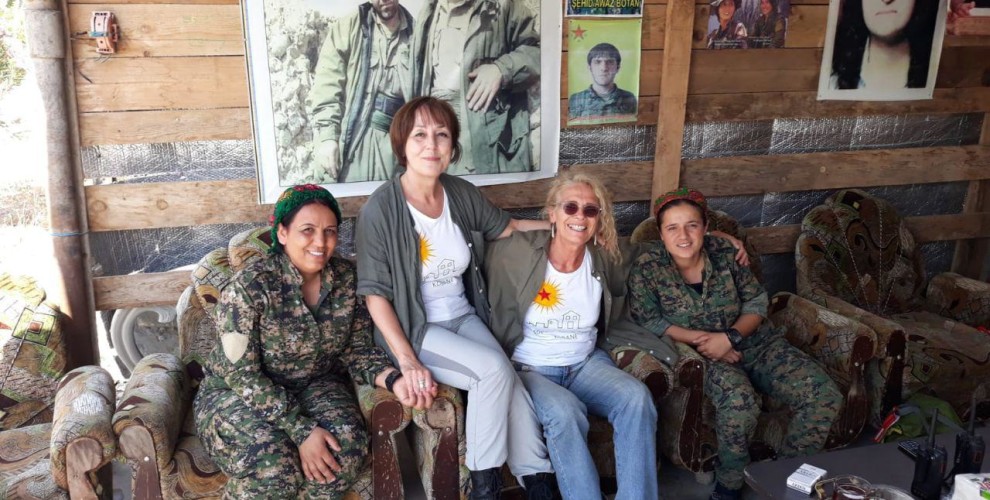Women’s Academy in Kobane: a project for women all over the world
Patrizia Fiocchetti and Carla Centioni were at opening ceremony of the Women’s Academy
Patrizia Fiocchetti and Carla Centioni were at opening ceremony of the Women’s Academy

The Women’s Academy of Kobane was officially opened on Sunday. Dedicated to Silan Kobane, the first martyr from the city, who died in 2004 in Basure Kurdistan, the Academy is the result of a joint effort and funds from Italy, the Basque Country, Belgium.
Patrizia Fiocchetti, writer and journalist, who has worked for over twenty years with political refugees and is now involved in several solidarity projects carried out also in Rojava, was in Kobane. A coming back, really, as Fiocchetti was in Kobane just after its liberation from DAESH, in January 2015.
Carla Centioni president of Ponte Donna, an Italian association, was also in Kobane for the opening, her association being the project leader for the Women’s Academy.
The project has been funded by the Valdese Church of Italy which used the contribution coming from Italian tax payers. Tax payers in Italy in fact devolve 8 per thousand of their tax declaration to an association of their choice.
Have co-founded the project, the Autonomous Province of Bolzano and the Basque city council of Durango. Among the contributors to the project are also Lucha y Siesta (women’s house in Rome), UIKI (Kurdistan Information Office in Italy) and the Kurdish Institute of Brussels.
In Kobane the project was supervised and devised by the women, through the Kobane Reconstruction Board and Kongreya Star.
ANF spoke to Patrizia Fiocchetti on Sunday evening.
How did the idea of the Women’s Academy came about?
The idea actually came during our previous visit to Kobane, in 2015, a month after the city had been freed from DAESH by the YPG and YPJ (People and Women’s Defense Units).
We talked with women here and the idea was that of a space to answer the need to discussion, meeting, sharing experiences, realities, ideas among women.
Of course the role of women in the liberation of Kobane and more in general in the same women’s liberation struggle is of transcendental importance. To there was a need for a space where also women from other countries, especially Western countries, could come and get to know the experience of the women in Rojava.
There was a need for us, women from Western countries to learn about the experience of the women here in the military field but also in the field of their own empowering and liberation.
You said it, the experience of women in Rojava is something which transcended the borders of Northern Syria. What was inspiring for you, also considering your own experience in Iran, with a freedom movement resisting the Khomeini regime.
Indeed, the experience of women in Rojava is absolutely crucial for us feminist women in Western countries. And also for me, who as you said, have lived a specific experience, it was important to see how our thoughts in terms of women’s liberation and struggle for equal rights has been completely overcome, totally transcended by these resisting women, here in the Middle East.
We need to take this example and this experience. It is an inspiration especially for the women in Europe: we are, indeed, going back to struggle for the defence or rights we thought settled and untouchable.
How did you find Kobane three years after its liberation by its own men and women.
I was really surprised to see the city almost completely rebuilt. My memory was of total silence, and destruction everywhere. But this time, we have found the city full of shops, lively, crowded, noisy and this that we were caught in the last days of Ramadan, so most shops were closed.
I think you can really see the level of participation from below, from the grassroots. It is clear and important even in this reconstruction phase which is not over.
The role of women is not only visible, but crucial not only in rebuilding the city in terms of its infrastructures, but also in terms of rebuilding the city’ social fabric. Women maintain their role as protagonist, at all level, we saw this in the municipality as well as in the military field, and in the social and education field. Of course, this is a city which cannot lower the guard as threats from neighbouring countries are always there.
What will be done in the Silan Women’s Academy?
The Academy is is a beautiful building and a beautiful space and will be used by women for so many things. All levels of life will find a space here, from the political to the economic, the social, the cultural.
The Academy will be run by the Women’s Foundation of Rojava.
Silan Women’s Academy
The project involved the construction of a building of 1500 square meters developed on three floors.
The Women’s Academy, like the Women’ s Houses in other parts of the world, is a unique place because it brings together the strength of the women who live there, but above all it is a space dedicated to the promotion of women's politics. It will be a project for both local and international social-cultural use.
The Kobane Women's Academy will be equipped with services that will cover in different ways the areas of the environment, education / training, health / health, water, agricultural and economic development, social protection, food security.
The Women's Academy has been built on a ground belonging to the Municipality of Kobane, donated by the municipal administration to serve the population of the Canton of Kobane.
The estimated population of Kobane city and the 541 surrounding villages that make up the Canton of Kobane is of around 500,000 people.